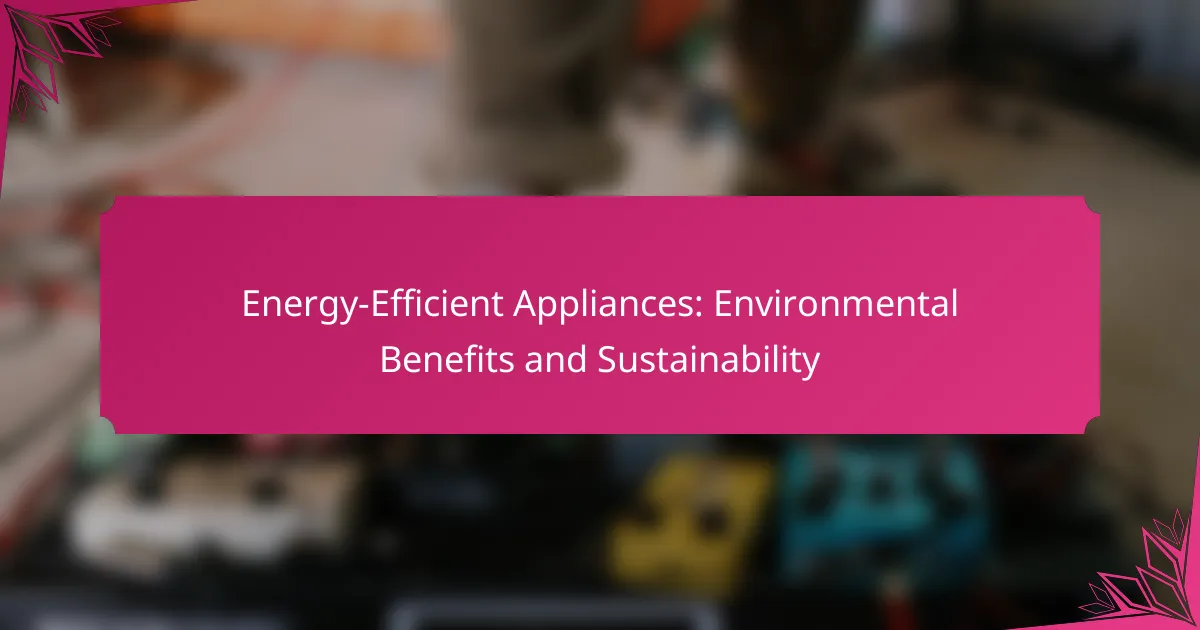Energy-efficient appliances play a crucial role in promoting sustainability by significantly reducing energy consumption and minimizing environmental impact. By utilizing advanced technology, these appliances not only lower greenhouse gas emissions but also help consumers save on utility bills while maintaining high performance. Investing in options like Energy Star certified products can lead to long-term savings and a healthier planet.
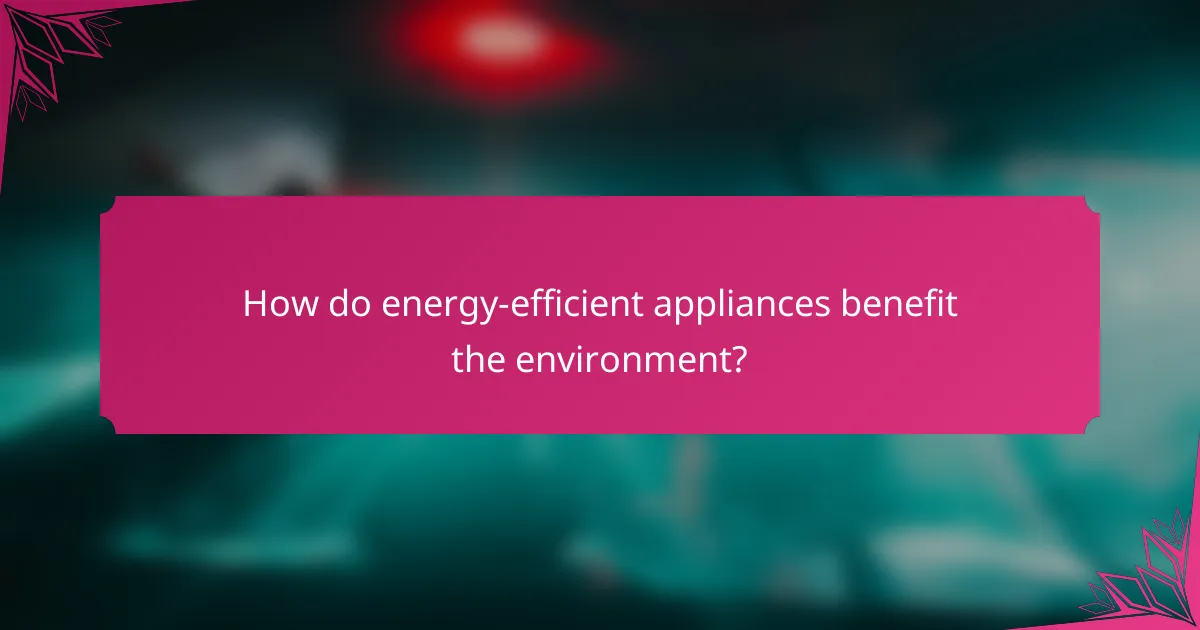
How do energy-efficient appliances benefit the environment?
Energy-efficient appliances significantly benefit the environment by reducing energy consumption, which leads to lower greenhouse gas emissions and less resource depletion. By using advanced technology, these appliances minimize their environmental impact while providing the same level of service as traditional models.
Reduced greenhouse gas emissions
Energy-efficient appliances contribute to reduced greenhouse gas emissions by consuming less electricity, which often comes from fossil fuel sources. For example, using an energy-efficient refrigerator can lower emissions by several hundred kilograms per year compared to a standard model.
When households switch to energy-efficient options, the cumulative effect can lead to substantial reductions in overall emissions at the community or national level. This shift supports global efforts to combat climate change and promotes cleaner air quality.
Lower energy consumption
Lower energy consumption is a hallmark of energy-efficient appliances, which are designed to use significantly less power than their conventional counterparts. For instance, an energy-efficient washing machine can use up to 50% less energy per load, translating to lower utility bills.
Many energy-efficient appliances are certified by programs like ENERGY STAR, which indicates they meet strict energy efficiency guidelines. Homeowners should look for these certifications when purchasing new appliances to ensure they are making environmentally responsible choices.
Minimized water usage
Minimized water usage is another critical benefit of energy-efficient appliances, particularly in dishwashers and washing machines. These appliances often use advanced technology to clean effectively while consuming less water, sometimes reducing usage by 30% or more compared to older models.
By choosing water-efficient appliances, consumers not only save on water bills but also help conserve this vital resource, especially in regions where water scarcity is a concern. Checking for water efficiency ratings can guide buyers in selecting appliances that align with sustainability goals.
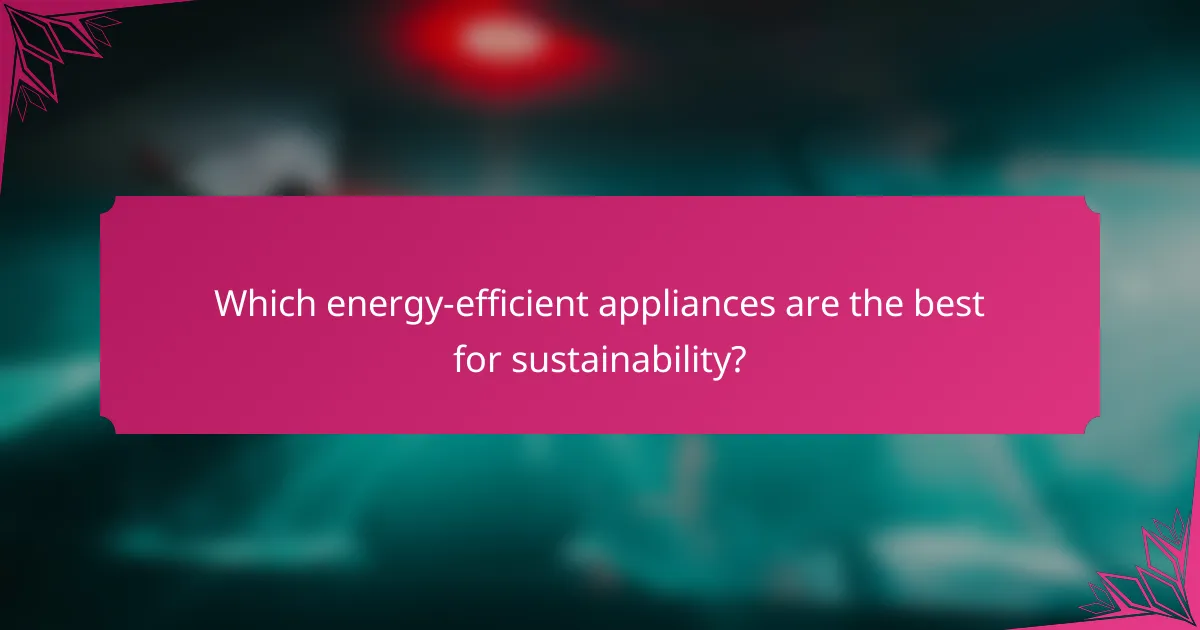
Which energy-efficient appliances are the best for sustainability?
Energy-efficient appliances that promote sustainability include those that significantly reduce energy consumption while maintaining performance. Key options are Energy Star certified refrigerators, high-efficiency washing machines, and LED lighting solutions, all designed to minimize environmental impact and lower utility bills.
Energy Star certified refrigerators
Energy Star certified refrigerators are designed to use less energy than standard models, often consuming 15-20% less electricity. These appliances utilize advanced insulation and efficient compressors to maintain optimal cooling while minimizing energy use.
When selecting a refrigerator, consider the size and features that suit your needs. Look for models with adjustable shelves and temperature controls, which can enhance efficiency. Additionally, check the Energy Star label to ensure compliance with energy-saving standards.
High-efficiency washing machines
High-efficiency washing machines use significantly less water and energy compared to traditional models, often reducing water usage by 30-50%. These machines employ advanced technology, such as load sensing and optimized wash cycles, to clean clothes effectively while conserving resources.
When purchasing a washing machine, consider front-loading models, which typically offer better energy efficiency. Look for features like quick wash settings and energy-saving modes to further enhance sustainability. Always check for the Energy Star certification to ensure optimal performance.
LED lighting solutions
LED lighting solutions are among the most energy-efficient options available, using up to 80% less energy than traditional incandescent bulbs. They have a longer lifespan, often lasting up to 25,000 hours, which reduces waste and the frequency of replacements.
When switching to LED lights, consider the brightness (measured in lumens) and color temperature (measured in Kelvin) to match your space’s needs. Look for Energy Star rated LEDs for guaranteed efficiency and performance. This transition not only lowers energy bills but also contributes to a more sustainable environment.
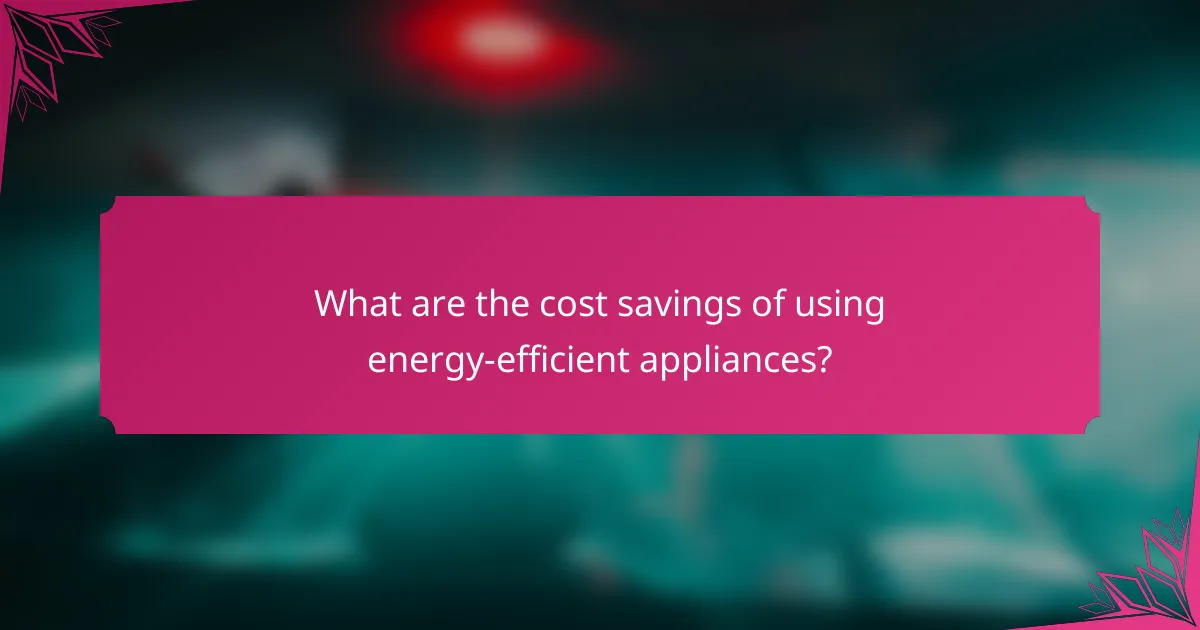
What are the cost savings of using energy-efficient appliances?
Energy-efficient appliances can significantly reduce your overall costs by lowering energy consumption, which translates into savings on utility bills. Over time, these appliances often pay for themselves through reduced energy expenses.
Lower utility bills
Using energy-efficient appliances can lead to noticeable reductions in monthly utility bills. For example, an energy-efficient refrigerator can use up to 50% less energy than older models, potentially saving you tens of dollars each month. This savings accumulates over the year, making a substantial impact on your budget.
To maximize savings, look for appliances with the ENERGY STAR label, which indicates compliance with strict energy efficiency guidelines. Regularly maintaining these appliances, such as cleaning filters and coils, can further enhance their efficiency and keep your bills low.
Long-term investment returns
Investing in energy-efficient appliances is not just about immediate savings; it also offers long-term financial benefits. While the upfront cost may be higher, the reduced energy bills can lead to a return on investment within a few years. For instance, a high-efficiency washing machine may cost more initially but can save you hundreds of dollars over its lifespan.
Consider the lifespan of appliances when evaluating their cost-effectiveness. Energy-efficient models often last longer and require fewer repairs, which can lead to additional savings. When shopping, calculate the total cost of ownership, including purchase price, energy use, and maintenance, to make informed decisions that benefit your wallet and the environment.
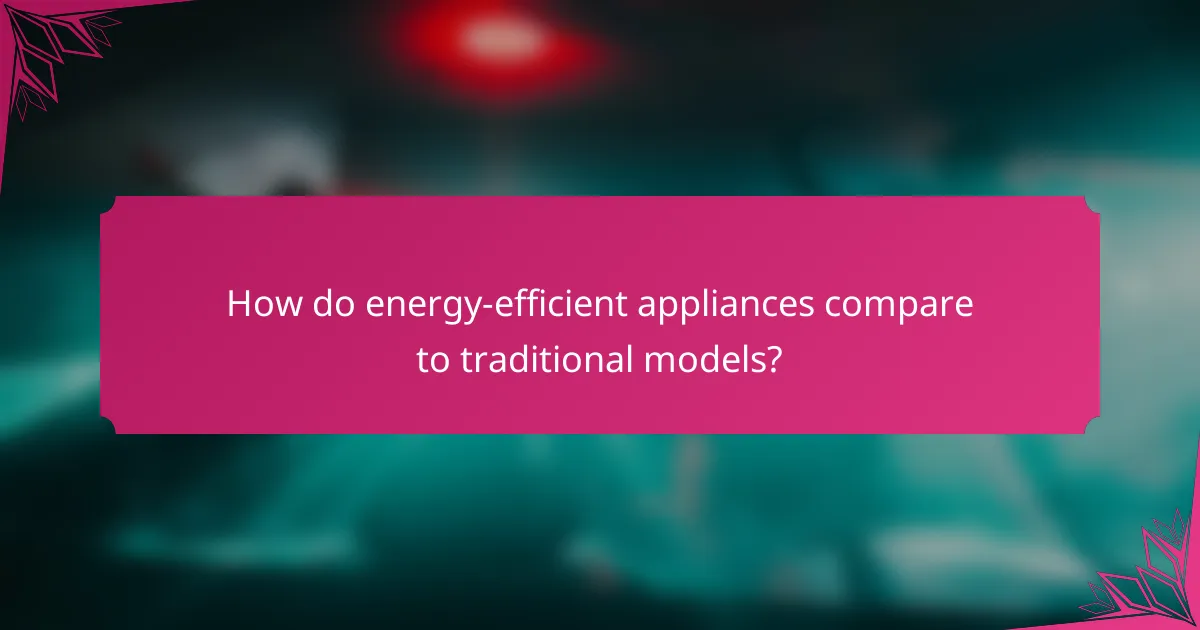
How do energy-efficient appliances compare to traditional models?
Energy-efficient appliances typically consume less electricity and water than traditional models, leading to lower utility bills and reduced environmental impact. These appliances are designed to perform effectively while minimizing resource use, making them a sustainable choice for households.
Efficiency ratings and performance
Energy-efficient appliances are often rated using systems like ENERGY STAR in the United States or similar certifications in other countries. These ratings indicate how much energy the appliance uses compared to conventional models, with higher ratings signifying better efficiency.
In practical terms, an ENERGY STAR-rated refrigerator might use 15-20% less energy than a standard model, translating into significant savings over time. Additionally, these appliances often incorporate advanced technology that enhances performance, such as better insulation or improved heating elements.
Initial costs versus savings
While energy-efficient appliances generally come with a higher upfront cost, they can lead to substantial savings on energy bills over their lifespan. For instance, a high-efficiency washing machine may cost 20-30% more than a standard one but can save users hundreds of dollars in energy and water costs over several years.
When considering the purchase, it’s important to calculate the total cost of ownership, which includes both the initial price and the expected savings. Look for appliances with a payback period of less than five years to ensure a worthwhile investment.
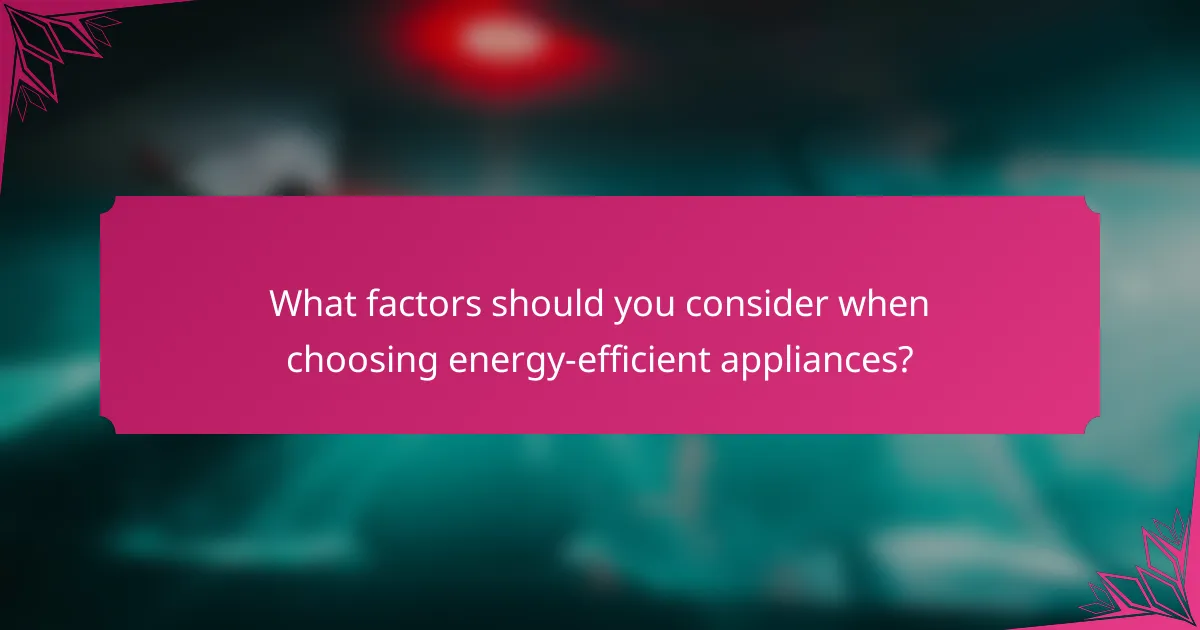
What factors should you consider when choosing energy-efficient appliances?
When selecting energy-efficient appliances, consider energy consumption ratings, size and capacity requirements, and brand reliability. These factors will help you choose appliances that not only save energy but also fit your needs and provide long-term value.
Energy consumption ratings
Energy consumption ratings indicate how much energy an appliance uses during operation. Look for appliances with the ENERGY STAR label, which signifies compliance with strict efficiency guidelines set by the U.S. Environmental Protection Agency or similar organizations in other countries.
Compare the energy usage of different models, often measured in kilowatt-hours (kWh) per year. Appliances with lower kWh ratings typically result in lower electricity bills, making them a cost-effective choice over time.
Size and capacity requirements
Choosing the right size and capacity for your appliances is crucial for efficiency and functionality. An appliance that is too large may waste energy, while one that is too small may not meet your needs effectively.
Measure your available space and consider your household’s usage patterns. For instance, a family of four may require a larger refrigerator than a single person, so assess your specific requirements before making a purchase.
Brand reliability and warranty
Brand reliability affects the longevity and performance of energy-efficient appliances. Research brands known for their durability and customer satisfaction, as these can save you money on repairs and replacements in the long run.
Check the warranty offered by the manufacturer. A longer warranty period often indicates confidence in the product’s reliability and can provide peace of mind regarding your investment.
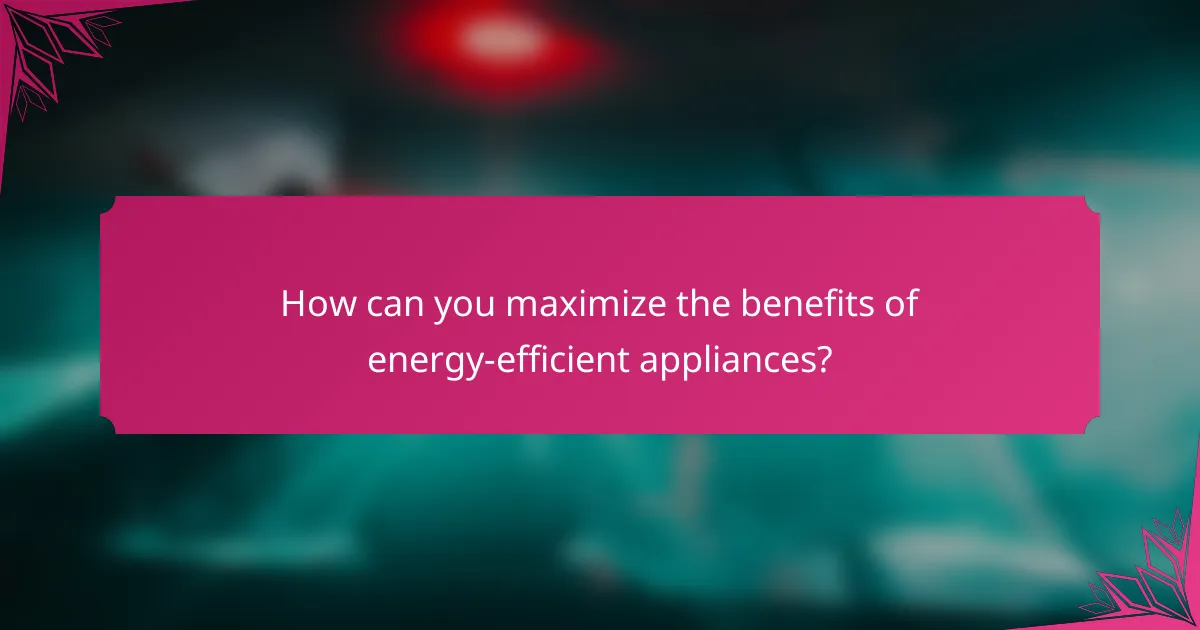
How can you maximize the benefits of energy-efficient appliances?
To maximize the benefits of energy-efficient appliances, focus on regular maintenance and proper usage. These practices not only enhance performance but also extend the lifespan of the appliances, leading to greater energy savings and reduced environmental impact.
Regular maintenance practices
Regular maintenance is crucial for ensuring that energy-efficient appliances operate at peak efficiency. This includes cleaning filters, checking seals, and inspecting components for wear. For example, cleaning the refrigerator coils can improve energy efficiency by up to 30%.
Schedule maintenance checks at least once a year to identify potential issues early. Keeping appliances in good working order helps avoid energy waste and costly repairs, making it a worthwhile investment.
Proper usage guidelines
Using energy-efficient appliances correctly can significantly enhance their benefits. For instance, running dishwashers and washing machines with full loads maximizes energy use, while adjusting settings to match load size can save energy.
Avoid overloading appliances, as this can lead to inefficiencies and potential damage. Additionally, consider using energy-saving modes when available, as these settings are designed to optimize performance while minimizing energy consumption.
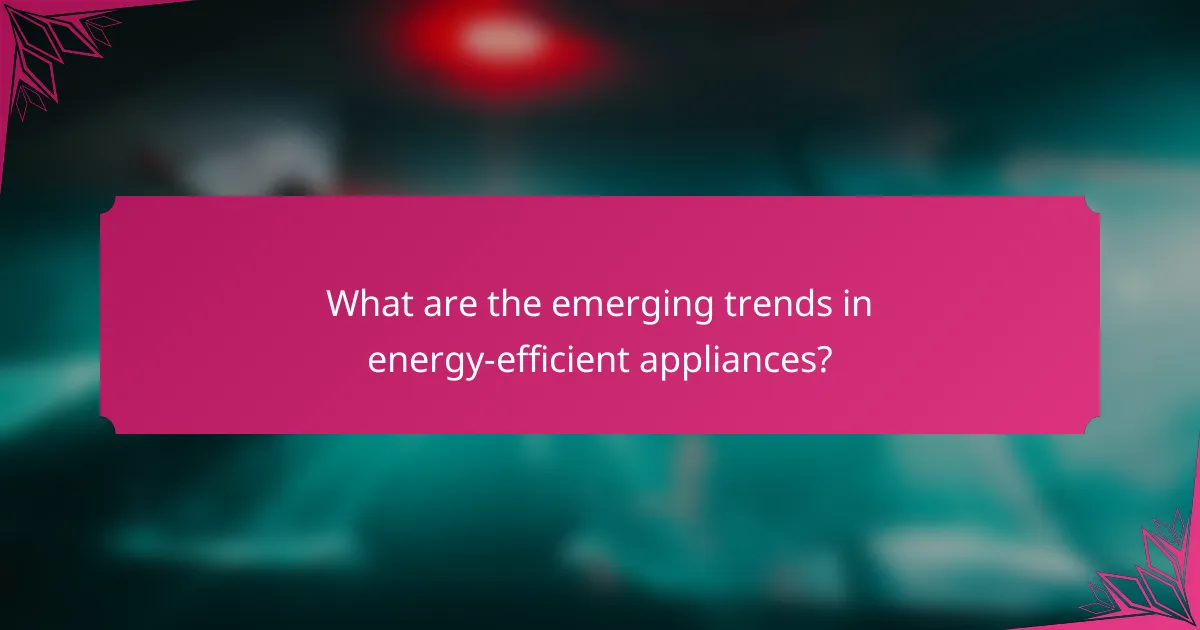
What are the emerging trends in energy-efficient appliances?
Emerging trends in energy-efficient appliances focus on advanced technology, smart home integration, and sustainable materials. These innovations aim to reduce energy consumption while enhancing user convenience and environmental sustainability.
Smart home integration
Smart home integration allows energy-efficient appliances to connect with home automation systems, enabling users to monitor and control energy usage remotely. This technology often includes features like scheduling, real-time energy tracking, and compatibility with voice assistants.
For example, smart thermostats can learn user preferences and adjust heating and cooling automatically, potentially reducing energy costs by 10-20%. Additionally, smart appliances can send alerts when maintenance is needed, ensuring optimal performance and longevity.
When considering smart appliances, look for those that are compatible with existing smart home ecosystems. Avoid devices that require proprietary hubs, as they may limit future upgrades or compatibility with new technologies.
